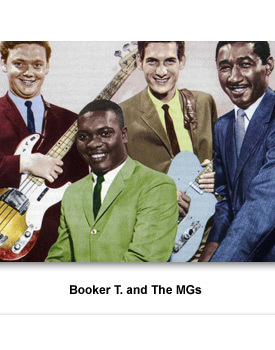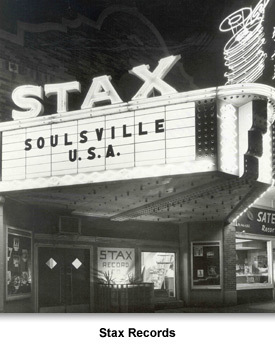Civil Rights / Cold War
Memphis Soul Music
Music was an important element in African American lives. This led to the development of new, distinct styles of music, including blues, black gospel, and soul.
African Americans, especially those from Memphis, were at the forefront in recording and performing these new styles. Many blues performers from the Mississippi Delta came to Memphis to record.
African Americans, especially those from Memphis, were at the forefront in recording and performing these new styles. Many blues performers from the Mississippi Delta came to Memphis to record.
Blues was one of many black styles that gained popularity during the 1950s. Before World War II, blues performers like Memphian Bukka White used acoustic instruments to record "race records" - music designed for black listeners.
After the war, electric guitars became widespread and gave the blues power. Memphis artist B.B. King helped develop the new electrified sound. White musicians also adopted the style. Racial barriers began to erode as black music was introduced to young white listeners.
Black gospel music – a lively mixture of sacred spirituals and hymns with blues and jazz - was a relatively new style of music. Many older clergymen frowned upon the new style, calling it “the Devil’s music,” but the new style became popular after the war as it was played over radio.
Memphis radio station WDIA, the first station with an all-black format, added gospel to their format early after the war. Gospel writers and Memphians Lucie E. Campbell and William H. Brewster enjoyed a great deal of their success as WDIA’s broadcasted artists, like megastar Mahalia Jackson, who had recorded their songs.
However, soul music, a form that shared musical roots with gospel, was even more popular with the young--black and white. Memphis labels Stax and Hi Records created a group of successful soul musicians such as Marvin Gaye, Sam and Dave, Wilson Pickett, and Al Green. The Memphis soul industry competed vigorously with Detroit’s, although the Memphis style was considered more original.
A group of Memphis players, two black and two white, joined together to form a band that became known for backing (playing music behind) other singers. Booker T. and The MG's (Steve Cropper, Booker T. Jones, Donald Dunn, and Al Jackson) provided a unique sound for Otis Redding, Rufus Thomas, Sam and Dave, Carla Thomas, and Wilson Pickett. They performed on more than 600 recordings at Stax and even produced their own hit song, an instrumental, "Green Onions." Listen to part of "Green Onions."
One of the greatest soul musicians was Otis Redding, who began recording at Stax/Volt in 1963 and continued until his death in an airplane crash in 1968. Redding's greatest hit was released after his death, "(Sittin' On) The Dock of the Bay," cowritten by Cropper. The song shot to number one on the charts and stayed there four weeks. Listen to part of the song here:
A group of Memphis players, two black and two white, joined together to form a band that became known for backing (playing music behind) other singers. Booker T. and The MG's (Steve Cropper, Booker T. Jones, Donald Dunn, and Al Jackson) provided a unique sound for Otis Redding, Rufus Thomas, Sam and Dave, Carla Thomas, and Wilson Pickett. They performed on more than 600 recordings at Stax and even produced their own hit song, an instrumental, "Green Onions." Listen to part of "Green Onions."
http://tn4me.org/audio/Green_Onions.mp3
One of the greatest soul musicians was Otis Redding, who began recording at Stax/Volt in 1963 and continued until his death in an airplane crash in 1968. Redding's greatest hit was released after his death, "(Sittin' On) The Dock of the Bay," cowritten by Cropper. The song shot to number one on the charts and stayed there four weeks. Listen to part of the song here:
http://tn4me.org/audio/Sittin_On_The_Dock_Of_The_Bay.mp3
By 1968 the style began to mirror changes in society. Black power was replacing non-violence themes. Isaac Hayes became a soul legend for singing such male-oriented tunes as “Shaft.” Hayes was a long-time songwriter and arranger for Stax Records in Memphis, playing backup for other performers.
Hayes began recording his own music in 1967 and had a hit with his “Hot Buttered Soul” album in 1969. Hayes starred in and recorded the theme for the Shaft movie in 1971. He won an Academy Award for best original theme song and then also won Grammy awards for the song.
While not as popular as in the 1960s and 1970s, soul music, much of which originated in Tennessee, remains popular today.
For more information on Stax Records, click here for part of a PBS program.
Hayes began recording his own music in 1967 and had a hit with his “Hot Buttered Soul” album in 1969. Hayes starred in and recorded the theme for the Shaft movie in 1971. He won an Academy Award for best original theme song and then also won Grammy awards for the song.
While not as popular as in the 1960s and 1970s, soul music, much of which originated in Tennessee, remains popular today.
For more information on Stax Records, click here for part of a PBS program.
Picture Credits:
- Photograph of the Stax Records marquee in 1967. Courtesy of the University of Memphis Special Collections
- Photograph of Isaac Hayes performing in a concert in 1973. Photograph by John White. U.S. Government
- Publicity photograph of Ike and Tina Turner around 1962. Ike recorded at Sun Records in Memphis, while Tina was born in Nutbush, Tennessee. They were married at the time the photograph was taken. Photograph by a employee with Michael Ochs Archives. Getty Images. This photograph may not be reproduced without permission of Getty Images.
- Photograph of Otis Redding singing in a 1962 concert. Photograph by Tony Frank. Corbis File Pictures. This photograph may not be reproduced without permission of Corbis Pictures.
- Cover of a CD by Memphis group Booker T. & The MG's. The CD is titled "The Very Best of Booker T. & The MG's." Pictured left to right are Donald Dunn, Booker T. Jones, Steve Cropper and Al Jackson, Jr. Tennessee State Museum Collection
- Photograph of Rufus Thomas performing on stage in a June 30, 1973 concert in Memphis. Courtesy of photographer Fred Griffith, The Commercial Appeal
Civil Rights / Cold War >> Everyday Life >> Music >> Memphis Soul Music






 Sponsored by: National Endowment for the Humanities
Sponsored by: National Endowment for the Humanities